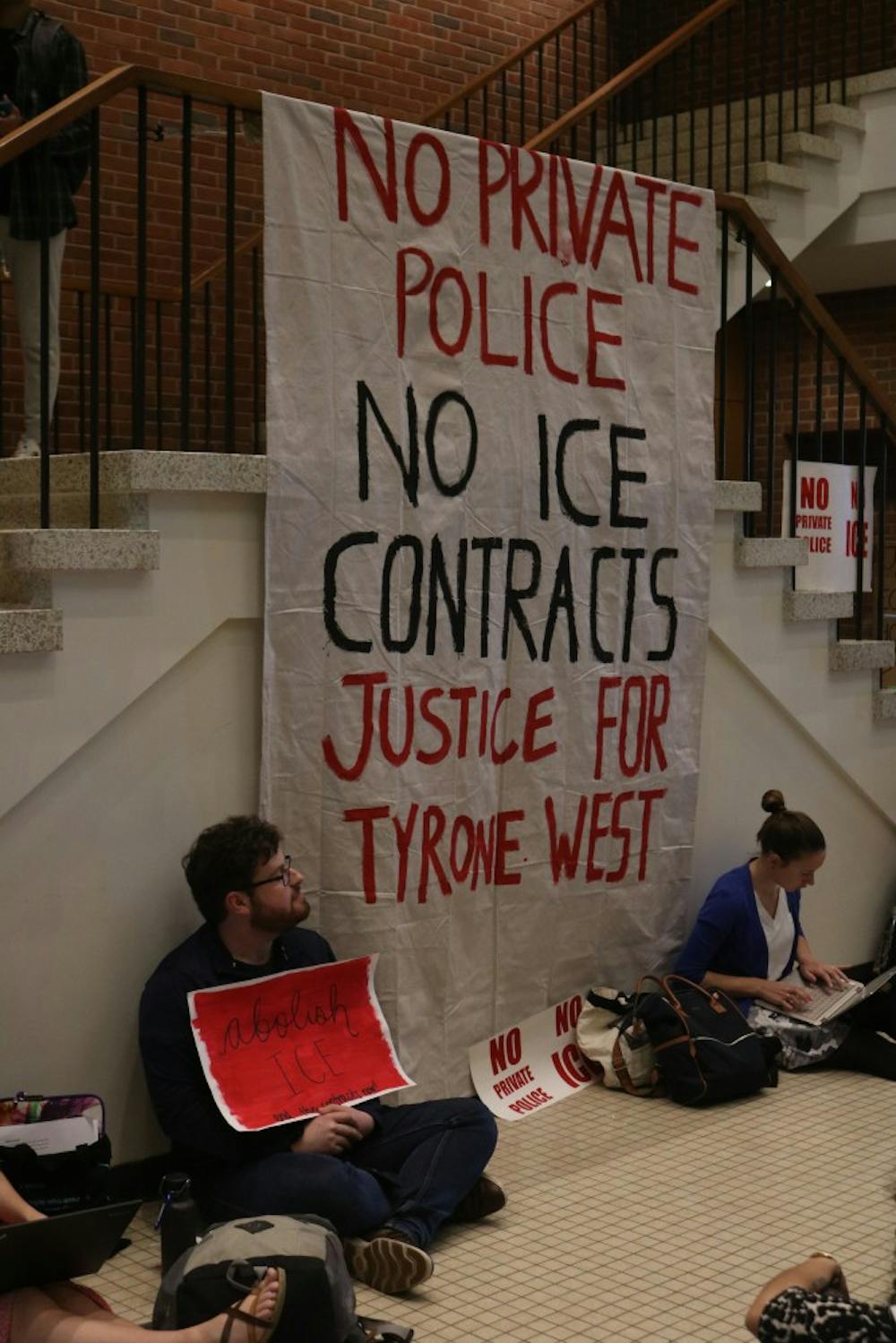For over three weeks, members of the Hopkins and Baltimore community have participated in a sit-in at Garland Hall to protest the proposed private police force and the University’s contracts with U.S. Immigration and Customs Enforcement (ICE). The protest was organized by Students Against Private Police (SAPP) and the Hopkins Coalition Against ICE (HCAI).
As the sit-in continues, protesters are working to ensure that their platform centers marginalized voices.
Mariam Banahi, a graduate student in the Department of Anthropology, explained that one goal the protesters have is to ensure that voices that are usually silenced are given a platform.
Banahi stated that protesters reached out to Goldsmiths Anti-Racist Action, a group occupying a building at Goldsmiths, University of London to protest racism, for insight into how to make the sit-in more inclusive.
“We’ve been in contact with the anti-racism occupation at Goldsmiths, and they’ve provided some necessary guidance on how we can proceed because they also had some similar problems with marginalized voices not being heard or centered and considering the various privileges that some of us don’t even realize we hold,” she said.
In addition, Banahi emphasized that she did not see the protest ending in the foreseeable future. Protester Jeremy Berger agreed with Banahi. He explained that the reason the protest has been able to go on for so long is because protesters have been taking shifts to ensure that there are bodies in Garland at all times.
“No one has been there for 24 hours a day. People are rotating to make sure everyone can still go to class and get their work done,” he said.
Sophomore Becca Sosa, who has also been participating in the protest, stated that students are working to foster a more safe and inclusive environment.
“I think the administration is hoping that we’ll get tired. When you have so many people living in a space together, obviously there’s gonna be some tensions, and admin is relying on that for this to come to an end,” she said.
Sosa described one threat to the inclusivity of the space. Sit-in participants had previously put up signs to label bathrooms in Garland as gender-neutral, but they were replaced this morning by excerpts from the Bible.
“Genesis 1:27 So God created mankind in His own image, in the image of God He created them; male and female He created them,” the sign read.
Sosa expressed her initial anger at the signs, noting that protesters soon took them down and replaced them with larger gender-neutral posters.
“It’s really disgusting but not out of character for people at this university to utilize religion in such a violent way. It’s really disgusting to alienate and [be] violent toward people who don’t necessarily identify with male or female,” she said.
Because protesters were worried that this act could make individuals feel uncomfortable in the sit-in, Sosa explained that the group would organize a community meeting to process the event and show support for others.
“Right now, our primary concern is to make sure that those people feel loved and welcome in this space,” she said. “We’re maintaining the status of these bathrooms as gender-neutral and we’re making a more concerted effort that no one takes down these signs.”
The protesters have contacted the Office of Institutional Equity (OIE) to report the incident, which Sosa stated was an obvious act of discrimination.
This past week, Garland protesters hosted several guest speakers to address other forms of student activism. Invited by student group Refuel Our Future, Extinction Rebellion gave a presentation on Monday to show how civic protests can pressure government officials to help end climate change. In addition, protesters invited groups like Teachers and Researchers United, Baltimore Harm Reduction Coalition and National Nurses United to explore political unrest in Baltmore. Professor Bill Leslie also gave a talk about the history of Hopkins protests.
On Sunday, sophomore Lana Weidgenant attended a talk from Pastor Heber Brown III at the Pleasant Hope Baptist Church about activism. She described being inspired by the event in an email to The News-Letter.
“If I’m going to be sitting somewhere doing work on my computer, I’m going to be doing that in Garland,” she wrote. “It’s the least I can do.”





